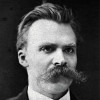“ One never perishes through anybody's fault but one's own. The only thing is that the death which takes place in the most contemptible circumstances, the death that is not free, the death which occurs at the wrong time, is the death of a coward. ”
Friedrich Nietzsche, Twilight of the Idols (1889). copy citation
| Author | Friedrich Nietzsche |
|---|---|
| Source | Twilight of the Idols |
| Topic | death time |
| Date | 1889 |
| Language | English |
| Reference | |
| Note | Translated by Anthony M. Ludovici |
| Weblink | https://www.gutenberg.org/files/52263/52263-h/52263-h.htm |
Context
“We should never forgive Christianity for having so abused the weakness of the dying man as to do violence to his conscience, or for having used his manner of dying as a means of valuing both man and his past—In spite of all cowardly prejudices, it is our duty, in this respect, above all to reinstate the proper—that is to say, the physiological, aspect of so-called natural death, which after all is perfectly "unnatural" and nothing else than suicide. One never perishes through anybody's fault but one's own. The only thing is that the death which takes place in the most contemptible circumstances, the death that is not free, the death which occurs at the wrong time, is the death of a coward. Out of the very love one bears to life, one should wish death to be different from this—that is to say, free, deliberate, and neither a matter of chance nor of surprise. Finally let me whisper a word of advice to our friends the pessimists and all other decadents.”
source



